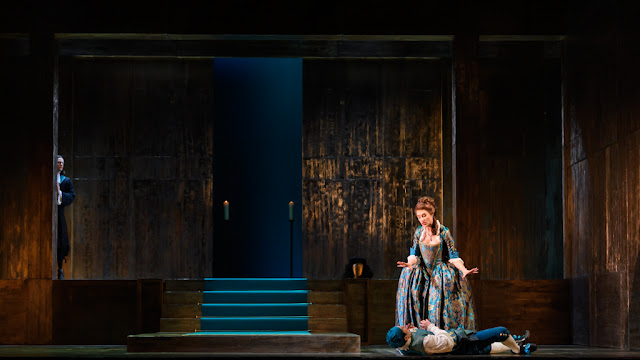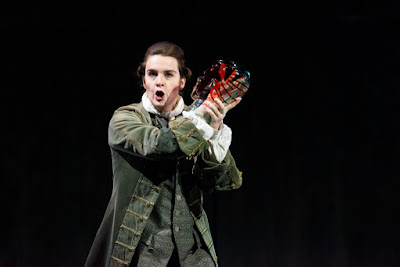 |
| Handel: Giulio Cesare - Clint van der Linde, Susanna Hurrell, Alexander Simpson English Touring Opera 2020 (Photo Jane Hobson) |
Reviewed by Robert Hugill on 7 March 2020 Star rating: (★★★★½)
Small of scale, big on drama, ETO's revival of one of Handel's greatest opera seria really creates a sense of musical drama
In revival, a production of an opera seria like Handel's Giulio Cesare is inevitably different. Most Handelian opera seria is 'closed box' drama of a type not unfamiliar to lovers of Agatha Christie type novels, a group of people coming together for a limited time in a single confined space. The nub the work is a series of interactions, as characters learn about each other and about themselves, rather than pure plot. And with a small cast, inevitably a new team of singers brings different flavours to this hothouse atmosphere. And the music changes too, in the programme for English Touring Opera's revival of James Conway's production of Handel's Giulio Cesare, they reprinted conductor Jonathan Peter Kenny's intelligent elucidation of the often misunderstood art of ornamentation in the arias. In Handel's day the singers were specialists, only singing this type of music and trained since youth in the art of co-creation of the music. But today's singers are generalists, so the ornamentation was pre-planned but tailored to the singer's voice; a different cast would bring differences.
 |
| Handel: Giulio Cesare - Ann Taylor English Touring Opera(Photo Jane Hobson) |
The plot of the opera is about the rational Romans (Cesare, Cornelia, Sesto) being fascinated, seduced and trapped by the exotic Egyptian siblings Cleopatra and Tolomeo with the two being different, at war with each other but in their own way dangerous. There is nothing specifically Egyptian about the opera, and Conway's production places it in the time of composition (1724) with the Romans as the 'rational' rulers from Great Britain's Protestant succession and the Egyptians as the exotic and seductive (and Roman Catholic) French - James Conway's article in the programme book draws some interesting parallels including one between Tolomeo and the boy King Louis XV.
One reason why performances of Handelian opera seria can drag on is that the performance conventions (long delays after arias, too much applause) and scenic requirements (pause every time the scene changes) can stretch things out. At ETO, in the pit Jonathan Peter Kenny ensured that things were kept ticking along nicely, with zippy speeds (and some impressive fast passage-work from his cast) and minimal pauses, whilst on stage designer Cordelia Chisholm's flexible gilt box and James Conway's fluid production ensured that the action flowed with never a pause. The evening finished a few minutes before 10.30pm, and flowed nicely; whilst the piece was cut, ETO managed to fit in a remarkable amount of music.
Conway does not make the mistake of having elements of Act One as out-and-out comedy (it is difficult to take Cleopatra's distress seriously if in the first half of the opera she has been treated light-heartedly), and Conway understands Handel's mosaic technique, making us understand a character by revealing different aspects in each aria. But there was a comic element, so that Susanna Hurrell's (Cleopatra) scenes in Act One with Paul-Antoine Bénos-Djian (Tolomeo) were funny, but disturbing too as it became clear that her teasing of him had a sexual element (quite how far they would go was an interesting question which Conway wisely does not answer), and also Bénos-Djian's Tolomeo had a submissive element, he seemed to like being tied up.
The singing was on a consistently very high level, meaning that we could enjoy the performance as performance and each singer went far beyond simply 'getting round' the notes, there was plenty of singing which used the complex passage-work and those vexed ornamentations for expressive purposes.
Hurrell made a sparky Cleopatra, strong-willed and purposeful, used to getting her own way. She brought out the strong, lively aspects of her personality in Act One, and was suitably retiring and seductive as 'Lidia' (Conway in the programme book makes the revealing comment that he hopes Cesare likes Cleopatra as much as Lidia!). Even without the surrounding muses, 'V'adoro pupille' was the aural and visual treat that it should be (here Cleopatra is a vision of the Virgin Mary rather than Venus), and then in the second half we got the wonderful trio of 'Per pieta', 'Piangero' and 'Da tempeste', each rightly bringing the house down in a different way. I enjoyed Hurrell's Cleopatra immensely, feeling that she brought the right combination of character, expression and technique to the role.
 |
| Handel: Giulio Cesare - Alexander Simpson, Susanna Hurrell, Paul-Antoine Bénos-Djian English Touring Opera 2020 (Photo Jane Hobson) |
Bénos-Djian was a brilliant Tolomeo, able to be charming but also wilful and not a little strange. He brought out the strength of Tolomeo's personality, but also the spoilt child too. The performance was camp without being fey; dressed in brilliant brocade it made Tolomeo sufficiently far from Cesare's grey clad uprightness, without Bénos-Djian making Tolomeo too fey. He was a definite threat, just inexperienced, and Bénos-Djian's used Tolomeo's music to really bring out the character.
Ann Taylor made a dignified Cornelia, always poised and rarely letting her emotions get the better of her. Cornelia's arias reflect this, the role is designed to show her nobility (in the sense that Handel's audience understood it), and Taylor understood how to bring this out by doing nothing yet expressing much. She was also unbending, particularly in the treatment of her son, Sesto (Kitty Whately), in forcing him to be the vengeful son she wants him to be. Taylor and Whately's duet at the end of Act One 'Son nata a lagrimar' was rightly one of the highlights, with the two singers complementing each other well and knowing when to hold back.
 |
| Handel: Giulio Cesare - Kitty Whately English Touring Opera 2020 (Photo Jane Hobson) |
Achilla is an important character in the plot and a surprisingly complex one. It is his behaviour in Act Three (when he turns on his boss, Tolomeo, after having been let down in the promise that Achilla might have Cleopatra), that brings about the opera's requisite happy ending. Edward Hawkins sang his two arias admirably, making us believe that Achilla really did care for Ann Taylor's Cornelia, and making the change of heart work. He also brought out the man's naivety. That Hawkins is a very tall man brought an added resonance to the role.
Curio does not get an aria, but he is important to the plot and Bradley Travis made this rather self-important character a key cog in the evening's machinations. Similarly, Alexander Simpson made a suitably oily cleric as Cleopatra's counsellor Nireno.
I have heard performances of Cesare's Act Two aria, 'Al lampo dell'armi' done without the concluding chorus (here Handel deliberately subverts the form an instead of the expected da capo, Cesare runs off and we hear the off stage chorus). This chorus and the opening one were admirably sung (from memory) by the eight singers from The Museum Singers.
In the pit we got lots of lovely solo moments (the horn in Cesare's Act One aria, the violin in his first aria in Act Two), plus some terrifically impulsive orchestral playing. Kenny kept the piece moving and his players (and singers) followed him admirably. The continuo group (John Cuthbert, keyboard, Gavin Kibble, cello, Toby Car, theorbo), though unseen, made a fine contribution to the recitative and this had a real dynamic impulse to it.
 |
| Handel: Giulio Cesare - Bradley Travis, Clint van der Linde, Susanna Hurrell English Touring Opera 2020 (Photo Jane Hobson) |
Elsewhere on this blog
- Musical peaks: Beethoven's Fidelio at Covent Garden with Lise Davidsen and Jonas Kauffmann (★★★½) - opera review
- Bringing the House Down: bass Brindley Sherratt on the gala at Glyndebourne for The Meath Epilepsy Charity - interview
- Communal experience & the re-telling of familiar stories: Bach's St John Passion from English Touring Opera (★★★★) - opera review
- Strong individual performances in the revival of Meyerbeer's Les Huguenots at the Deutsche Oper, Berlin (★★★★) - opera review
- His message still resonates with us today: artistic director Marios Papadopoulos discusses the Oxford Philharmonic's year-long Beethoven Festival - Interview
- Still in fine form: Meyerbeer's Le prophète returns to the Deutsche Oper, Berlin with Gregory Kunde back in the title role (★★★★★) - opera review
- Pianist Iyad Sughayer in Khachaturian, Mozart and Liszt for the City Music Foundation (★★★★) - concert review
- Spareness, clarity, quirkiness: William Howard plays Howard Skempton (★★★★) - cd review
- The cello sonata from early Beethoven to Shostakovich: Anglo-French duo Lydia Shelley & Nicolas Stavy at Conway Hall - concert review
- The shipwrecked world, and nature extinct: Musica Antica Rotherhithe gives the UK premiere of Michelangelo Falvetti's Il Diluvio Universale in aid of Operation Noah - concert review
- The two are very different disciplines: best known as a film & TV composer, I chat to Stuart Hancock about 'Raptures' his new disc of concert music - interview
- The art of the lute: Thomas Dunford and the Academy of
Ancient Music put the Baroque lute in the spotlight from concertos to
trio sonatas and a solo suite (★★★★) - concert review
- Home











Jonathan Peter Kenny’s ornaments were absolutely not suited to the singers in any way. It sounded as if he had written them regardless of the singer and that they were forced to sing them. Rather than highlighting the strongest parts of the singers’ voices they sometimes sounded strained and awkward. Because they had been written out and learned there was nothing spontaneous about them and the da capos just became awkward and bad versions of the Handel rather than having any dramatic or emotional meaning. What a shame for a conductor’s ego to get so much in the way that the singers end up not showing their best assets and the da capo becomes interminable rather than keeping us on the edge of our seats with excitement. Someone stop this man from ruining any more Handel! Otherwise a spot on review I thought!
ReplyDelete